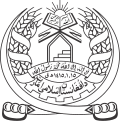 |
|---|
The Politburo of the Central Committee of the People's Democratic Party of Afghanistan or Afghan Politburo was the policy-making organ and institution within Afghanistan's political structure when the PDPA Central Committee and the PDPA Congress were not in session. Only one politburos was formally elected; at the 1st Congress, despite this, the membership line-up was altered numerous times during the PDPA's existence.